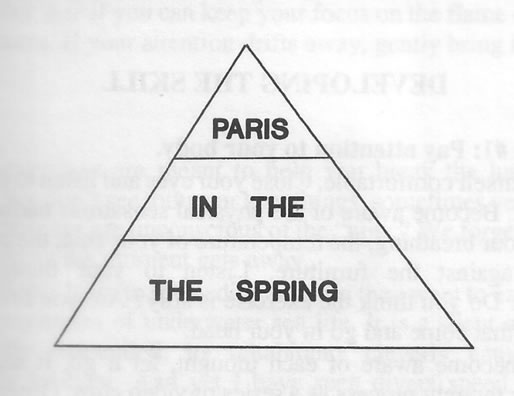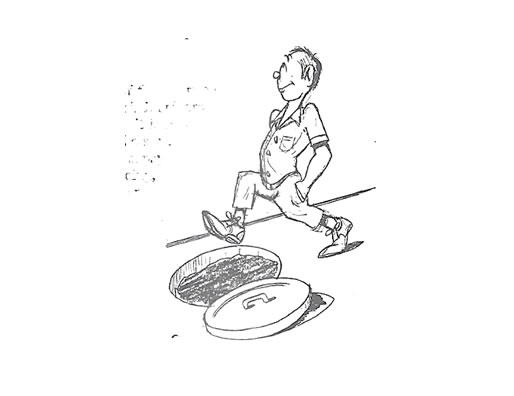Quantum Leap Thinking: Paying Attention
Welcome to Part 5 of The Magic of Quantum Leap Thinking: Paying Attention.
In the previous four articles, I covered the foundation of which Quantum Leap Thinking is based: Creative Thinking, Managing Change, and Continuous Learning.

Do you really pay attention? You can develop awareness to take your own quantum leaps!
If you are a new reader, I invite you to read the first article.
In this next series, we are going to explore the 15 Points of Quantum Leap Thinking, carefully balanced on the above 3-part foundation. (see article #2)
Build Your Foundation For Quantum Leap Thinking By Paying Attention
Let’s start with the incredibly crucial point – Paying Attention.
Do you really pay attention? I’m sure you do. But on what and for how long? Perhaps you pay attention to the negative; perhaps the positive. Perhaps you’re addicted to your Smartphone. Perhaps you’re easily distracted. Do you see what’s right before you?
Sadly, most people do not really pay attention to the present.
Fritze Pearls, the father of Gestalt therapy, said, “Most anxiety and stress are caused by living in a dead past or an unborn future. Guilt from the past. fear of the future.”
Read the sentence in the triangle shown below:

What did you read? If you are like the majority of people you read, PARIS IN THE SPRING. If so, read it again and this time pay attention. The sentence reads, PARIS IN THE THE SPRING. Granted, this is a bit of a mental trick. But I hope you get the point. We are conditioned to see what we expect to see and what we want to see.
Testing Your Powers Of Perception
Here’s a mental game. Please participate and flow with your thoughts.
- Pay attention to your body. Take a breath. Be aware of your heart beating. Be aware of the weight of your body against the chair.
- Pay attention to your thoughts. Your thoughts are sometimes called your ‘mind chatter’ or ‘self-talk. And they are often based on worry and fear.
- Thoughts come and go. Notice a thought and then, let it go. Observe what the next thought behind the thought you just had is. Good for you. You paid attention.
- Pay attention to your surroundings. Look around you. Take your time. If you’re outside, notice the breeze, the sound of traffic, birds, a plane flying overhead. If you’re inside, notice the variety of colors in the room and your furniture. Notice the sounds, the hum of a refrigerator. Good for you. You paid attention again.
- Pay attention to what you touch. Take a piece of your favorite fruit, a strawberry, a grape or an orange. Observe the color. Feel the texture. Smell the skin. If you choose an orange, cut it open and hear the sound as you slice it. Observe the color and texture inside. Take a bite. Savor the flavor. Nothing else exists.
In order to do the above exercise, you had to slow down.
Years ago, I lost my luggage when I arrived at a speaking gig in Arizona. The day was perfect. But what did I do for the next two hours as I walked near my hotel? I fussed and worried, missing the smell of the flowers and the gentle breeze. Finally, slowed down, let go, came to the present moment, and was rewarded with all the day had to offer. And I slowed down. Yes, my luggage finally made it.

Slowing Down Can Help You Pay Attention
Let’s ramp up your involvement.
Once you’ve slowed down, you can pay attention:
- To your emotions. Your ability to be in touch with your emotions gives you direction to make the decisions necessary to enhance your emotional well-being. And, you will notice you do not always have to act on your emotions.
- To your body. Your body is continually sending signals when you are hungry, when you are tired, when you’re scared and when you’re doing the right or wrong thing. Pay attention.
- To your thoughts. Your thoughts precede your actions. You may not think so, but you have control over what you think. When you learn to listen to yourself, you will recognize negative thoughts like shame and guilt. And – you can change judgment into curiosity, criticism into suggestions and guilt into understanding.
- To others. Most people are so eager to get across their point of view that they forget to listen to others. They don’t realize that in order to be heard, they must first listen.
Invisible opportunities surround us all the time. In order to see them, you must slow down and pay attention. It is a skill with which you can develop awareness and take your own quantum leaps!

The secret to increasing the quality of your life – is to pay attention.
IMAGINE THAT!
James Mapes is a keynote speaker, best-selling author, coach and hypnotist. His most recent book IMAGINE THAT! Igniting Your Brain for Creativity and Peak Performance is the first web-supported book with access to 21 video-coaching clips.

James Mapes is the founder of Quantum Leap Thinking™, creator of The Transformational Coach™, expert on the psychology of “applied imagination,” best-selling author, highly acclaimed business speaker, consultant, seminar leader and personal excellence coach.
